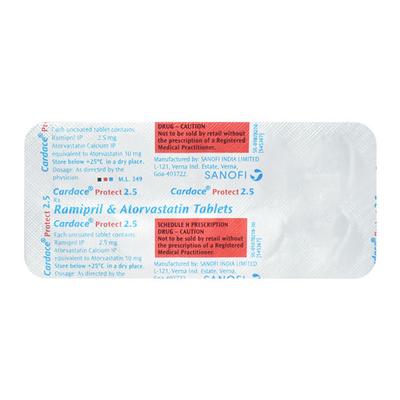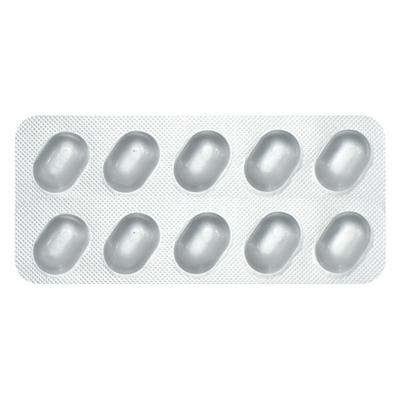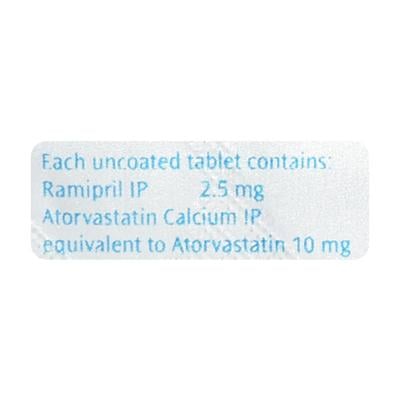

Netmeds First Membership
Quick Links
Introduction About CARDACE PROTECT 2.5MG TABLET
CARDACE PROTECT 2.5MG TABLET is a combination of Ramipril and Atorvastatin which belongs to the group of medicines called Angiotensin-converting enzyme (ACE) inhibitor and HMG-CoA reductase inhibitor respectively. CARDACE PROTECT 2.5MG TABLET is used to manage high blood pressure and high levels of cholesterol and triglycerides in the blood. CARDACE PROTECT 2.5MG TABLET is also used to reduce the risk of heart attack or stroke.
Hypertension is a condition in which force of the blood is consistently high against the walls of the arteries. Cholesterol and triglycerides are fats that are made in your body and found in some foods that can block the blood vessels which can increase the risk of heart attack and stroke, or other complications.
Heart attack is a condition which occurs due to blocked or reduced flow of blood to the heart muscle. Stroke is a condition which occurs due to blockage of blood supply to the brain or when the blood vessel in the brain ruptures and bleed.
Before taking CARDACE PROTECT 2.5MG TABLET inform your doctor if you have any problems related to kidney, liver, lungs, and heart or if you have other conditions or problems such as diabetes, hypothyroidism, low blood pressure, dehydration problems, collagen vascular disease (such as scleroderma).
Before taking CARDACE PROTECT 2.5MG TABLET inform your doctor if you are pregnant or breast-feeding. Consult your doctor for advice.
If you are taking any other medicines for other conditions or if you have history of drug allergy inform to your doctor as it may manage drug-related interactions and serious side effect.
Your doctor may check your kidney function, blood pressure, electrolyte levels in your blood at regular intervals during management with CARDACE PROTECT 2.5MG TABLET.
The most common side effects of CARDACE PROTECT 2.5MG TABLET are headache, nausea, dizziness, diarrhoea, muscle, and stomach pain. Consult your doctor if your side effects worsen.
Uses Of CARDACE PROTECT 2.5MG TABLET
It is used to:
- manage high blood pressure and high cholesterol
- prevent the risk of heart attack or stroke
How CARDACE PROTECT 2.5MG TABLET Works
CARDACE PROTECT 2.5MG TABLET helps to reduce high blood pressure and high cholesterol and triglyceride levels in the blood, where Ramipril works by inhibiting the activity of an enzyme called Angiotensin converting enzyme (an enzyme which is responsible for causing constriction of blood vessels) which enhances easy flow of blood around the body. Atorvastatin works by inhibiting the action of an enzyme called HMG-CoA reductase, which is required by the liver for the formation of cholesterol.
How to use CARDACE PROTECT 2.5MG TABLET
Take CARDACE PROTECT 2.5MG TABLET as directed by your physician. Swallow the medicine as a whole and do not crush or chew the medicine. Your doctor will decide the right dose depends on your age, body weight and disease condition.
Side Effects Of CARDACE PROTECT 2.5MG TABLET
Common
- headache
- tiredness
- dizziness
- orthostatic hypotension (dizziness while standing up from sitting or lying position)
- dry cough, inflammation of sinus and nasal passages
- shortness of breath
- stomach or gut pain
- diarrhoea
- indigestion
- constipation
- nausea
- skin rash with or without raised area
- chest pain
- muscle pain or cramps, joint and back pain
- signs of high potassium levels in the blood (irregular heartbeat, chest pain muscle weakness)
- throat pain
- nosebleed
- signs of high blood sugar (dry mouth, fruity-breath odour, confusion, increased thirst)
Uncommon
- ringing in ears or head sensation
- numbness, tingling or pricking sensation in arms, legs, or feet
- altered taste sensation
- sleep problems, insomnia, nightmares
- depression, anxious, restless
- loss of memory
- hair loss
- signs of intestinal angioedema (abdominal pain, vomiting and diarrhea)
- heartburn, dry mouth
- increased urination
- excess sweating
- loss of appetite
- belching
- flushing
- blurred vision
- fever
- impotence (inability to achieve erection)
- signs of eosinophilia (weight loss, tiredness, rash, weakness)
- weight gain
- signs of low blood sugar (sweating, tiredness, hunger, shakiness)
Rare
- shakiness or confusion
- red and swollen tongue
- nail problems (loosening or separation of a nail from its bed)
- red, itchy, swollen, or watery eyes
- cold hands or feet
- anemia
- signs of low while blood cells (fever, infections, mouth sores)
- signs of low platelet count (easy bruising or bleeding)
- tendon injury
Stop taking CARDACE PROTECT 2.5MG TABLET and contact your doctor immediately if you experience any of the following side effects:
- severe allergic reactions (such as swelling of the face, lips, tongue, and/or throat which can lead to difficulty in breathing or swallowing)
- severe skin reactions such as stevens johnson syndrome, toxic epidermal necrolysis, or erythema multiforme (such as rash, blistering and reddening of skin, mouth ulcers, and worsening of previous skin disease)
- signs of lung problems (such as shortness of breath or cough)
- signs of blood or bone marrow problems (such as easy bruising, prolonged bleeding, bleeding from gums, purple spot and blotches on the skin, sore throat, repeated infections, pale skin, tiredness, fainting and dizziness)
- signs of inflamed pancreas (severe stomach and back pain)
- signs of liver problems such as hepatitis or liver damage (such as fever, chills, loss of appetite, stomach pain, nausea, yellowing of skin or white of the eyes)
- fast or irregular heartbeat, chest pain, chest tightness, including heart attack or stroke
- rhabdomyolysis (abnormal muscle breakdown causing muscle weakness, pain, tenderness, red-brown discoloration of urine, weakness and raised body temperature)
- lupus-like disease syndrome (such as joint disorders, rash and altered count of blood cells)
How To Manage Side Effects
Diarrhoea:
Drink plenty of fluids such as water, fruit juices or electrolytes (ORS) to avoid dehydration.
Nausea or Vomiting:
Try to take this medicine with, or just after, a meal or snack and stick to simple meals and do not eat oil rich or spicy food.
Dizziness:
Lie down until dizziness passes away and then move slowly and carefully. Take plenty amount of rest and drink plenty of fluids.
Stomach pain:
Try to take rest and relax. Eat and drink slowly or try to have smaller and frequent meals. Keep a heat pad on your stomach.
Warning & Precautions
Pregnancy
CARDACE PROTECT 2.5MG TABLET is not recommended for use in pregnancy as it may cause serious harm to the baby and follow reliable contraceptive measures if you are a woman of childbearing potential. Consult your doctor before taking CARDACE PROTECT 2.5MG TABLET.
Breastfeeding
CARDACE PROTECT 2.5MG TABLET is not recommended for use in breast-feeding women. Consult your doctor before taking CARDACE PROTECT 2.5MG TABLET.
Driving and Using Machines
Do not drive or operate any machines if you experience dizziness, which usually occurs at the beginning of the management or when taking higher doses of this medicine. Consult with your doctor before taking CARDACE PROTECT 2.5MG TABLET.
Alcohol
Consumption of alcohol is not recommended during management with CARDACE PROTECT 2.5MG TABLET as it may cause dizziness or light-headedness.
Kidney
CARDACE PROTECT 2.5MG TABLET should be used with caution in patients with kidney impairment and not recommended for use in patients with renal artery stenosis (narrowing of blood vessels that leads to kidney) or patients undergoing dialysis or other types of blood filtration methods. Consult your doctor before taking CARDACE PROTECT 2.5MG TABLET.
Liver
CARDACE PROTECT 2.5MG TABLET should be used with caution in patients with liver impairment and not recommended for use in patients with active liver disease. Consult your doctor before taking CARDACE PROTECT 2.5MG TABLET.
Allergy
Do not take CARDACE PROTECT 2.5MG TABLET if you are allergic to Atorvastatin, Ramipril or any other ingredients of CARDACE PROTECT 2.5MG TABLET.
Lungs
CARDACE PROTECT 2.5MG TABLET should be used with caution in patients with severe respiratory failure. Consult your doctor before taking CARDACE PROTECT 2.5MG TABLET.
Heart Disease
CARDACE PROTECT 2.5MG TABLET should be used with caution in patients with heart problems. Consult with your doctor before taking CARDACE PROTECT 2.5MG TABLET.
Others
CARDACE PROTECT 2.5MG TABLET is not recommended for use if you have:
- history of angioedema
- low or unstable blood pressure
Before taking CARDACE PROTECT 2.5MG TABLET, inform your doctor if you have:
- desensitization management for allergic reactions due to bee or wasp stings
- high levels of potassium in the blood
- upcoming major surgery including dental surgery which requires anaesthesia for numbness or sedation
- condition or management that may cause decrease in sodium levels in the blood
- collagen vascular disease such as scleroderma or systemic lupus erythematosus
- previous history of stroke bleeding into the brain, or have small pockets of fluid accumulation due to stroke
- hypothyroidism
- history of muscle problems
Use in pediatrics:
CARDACE PROTECT 2.5MG TABLET is not recommended for use in children and adolescents below 18 years of age. Consult your doctor before taking CARDACE PROTECT 2.5MG TABLET.
Use in geriatrics:
CARDACE PROTECT 2.5MG TABLET should be used with caution in elderly patients above 65 years of age, usually initiating the management with lowest effective. Consult your doctor taking CARDACE PROTECT 2.5MG TABLET.
Interactions
A. Drug-Drug interactions:
Before taking CARDACE PROTECT 2.5MG TABLET inform to your doctor if you are taking any of these following medicines:
- indomethacin, ibuprofen, aspirin (used to relieve pain and swelling)
- ephedrine, noradrenaline, or adrenaline (used to manage low blood pressure, asthma, allergies, or heart failure)
- sacubitril/valsartan (used to manage long-term heart failure)
- ciclosporin, sirolimus, everolimus (used to manage organ rejection after transplant)
- furosemide (used to manage edema or high blood pressure)
- potassium salts or potassium-sparing diuretics such as spironolactone, amiloride, triamterene (used to retain or increase potassium levels)
- erythromycin, clarithromycin, telithromycin, fusidic acid, trimethoprim alone or in combination with sulfamethoxazole (used to manage bacterial infections)
- warfarin, heparin (used to manage blood clots)
- prednisolone (used to manage swelling)
- allopurinol, colchicine (used to manage gout or decrease uric acid levels in blood)
- procainamide (used to manage irregular heart rate)
- temsirolimus (used to manage cancer)
- racecadotril (used to manage diarrhea)
- insulin, vildagliptin (used to manage diabetes)
- telmisartan, olmesartan or aliskiren (used to manage high blood pressure)
- lithium (used to manage mental health problems)
- ketoconazole, itraconazole, voriconazole, fluconazole (used to manage fungal infections)
- gemfibrozil, ezetimibe, colestipol (used to manage high cholesterol levels)
- verapamil, amiodarone, and digoxin (used to manage irregular heart rhythm)
- amlodipine, diltiazem (used to manage high blood pressure or angina)
- letermovir (used to manage cytomegalovirus)
- ritonavir, lopinavir, atazanavir and combination of tipranavir/ritonavir (used to manage HIV)
- telaprevir, boceprevir and combination of elbasvir/grazoprevir (used to manage hepatitis C)
- oral contraceptives
- stiripentol (used to manage seizures)
- St. john’s wort (used to manage depression)
- cimetidine (used to manage heartburn and peptic ulcers)
- phenazone (used to manage pain)
- antacids containing aluminium or magnesium (used to manage indigestion)
B. Drug-Food interactions:
While taking CARDACE PROTECT 2.5MG TABLET, avoid taking large quantities of grapefruit juice as it can alter the effects of this medicine resulting in undesired therapeutic outcome.
Overdosage:
If you or anyone else accidentally takes too much of this medicine, consult your doctor immediately. Symptoms of overdosage are low blood pressure, slow heart rate, electrolyte disturbances, and kidney failure.
Synopsis
| Drug | : | Ramipril, Atorvastatin |
| Pharmacological Category | : | Angiotensin-II converting enzyme inhibitor, HMG-CoA reductase inhibitor |
| Therapeutic Indication | : | Manages high blood pressure and high cholesterol, Manages the risk of heart attack or stroke |
| Dosage Forms | : | Capsule, Tablet |
More Information
- Keep CARDACE PROTECT 2.5MG TABLET out of reach of children
- Store at room temperature
FAQs About CARDACE PROTECT 2.5MG TABLET
Q: What to do If I forget to take CARDACE PROTECT 2.5MG TABLET?
A: You should take CARDACE PROTECT 2.5MG TABLET immediately when you remember. If it is time for your next dose skip the dose and follow your regular dose schedule. Do not double the dose to match up your missed dose.
Q: Does CARDACE PROTECT 2.5MG TABLET impair ability to drive?
A: Yes, CARDACE PROTECT 2.5MG TABLET may cause dizziness usually at the beginning of the management or when taken in higher doses, do not drive or operate any machines which requires concentration because it can impair your ability to drive or work.
Q: If I have low blood pressure can I continue taking CARDACE PROTECT 2.5MG TABLET?
A: No, do not take CARDACE PROTECT 2.5MG TABLET if you have low or unstable blood pressure. While taking this medicine avoid getting dehydrated and do not take very low salt diet other than doctor’s advice. Consult your doctor for advice before taking this medicine.
Q: Can CARDACE PROTECT 2.5MG TABLET cause muscle pain?
A: Yes, CARDACE PROTECT 2.5MG TABLET may cause muscle pain, weakness, and tenderness in some patients, and it should be used with caution in elderly patients (above 65 years of age) particularly who are having history of muscle related problems.
Q: What foods should I avoid while taking CARDACE PROTECT 2.5MG TABLET?
A: While taking CARDACE PROTECT 2.5MG TABLET avoid eating foods high in fat or cholesterols such as fried or processed foods, grapefruit juice, dairy products, and red meat which can lead to poor therapeutic outcome in managing the disease. Consult your doctor before taking.
Q: Can CARDACE PROTECT 2.5MG TABLET be taken during pregnancy?
A: No, CARDACE PROTECT 2.5MG TABLET is not recommended for use in pregnancy as it may cause serious harm to the baby. If you are women of childbearing potential, follow effective method of birth control to manage pregnancy while taking CARDACE PROTECT 2.5MG TABLET.
References
1. KD. Tripathi. Cardiovascular Drugs. Essentials of medical pharmacology. Seventh edition. 2013. Page – 503-505 & 636-637.
2. Ferrer Internacional S.A. Pharmacodynamic Equivalence of Ramipril 10 mg and Atorvastatin 40 mg Administered as a Cardiovascular (CV) Polypill Acetylsalicylic Acid-Atorvastatin-Ramipril (AAR) as Compared to Monotherapy. NIH U.S. National Library of Medicine ClinicalTrials.gov. [Revised on April 2017] [Accessed 4th April 2022] https://clinicaltrials.gov/ct2/show/NCT02791958
3. Piotr Ruszkowski, Anna Masajtis-Zagajewska, and Michal Nowicki. Effects of combined statin and ACE inhibitor therapy on endothelial function and blood pressure in essential hypertension - a randomised double-blind, placebo-controlled crossover study. PMC. NIH National Library of Medicine, National center for biotechnology information. September 2019. [Accessed 4th April 2022] https://www.ncbi.nlm.nih.gov/pmc/articles/PMC6728690/
4. Sun Pharmaceutical Industries Europe B.V. Electronic Medicines Compendium (EMC). [Revised in December 2021] [Accessed 4th April 2022] https://www.medicines.org.uk/emc/files/pil.4339.pdf
5. Sanofi S.r.l. Electronic Medicines Compendium (EMC). [Revised in November 2020] [Accessed 4th April 2022] https://www.medicines.org.uk/emc/files/pil.8066.pdf
Useful Diagnostic Tests
- Kidney Function Test
- Lipid profile









